Overview
In the demanding world of healthcare, providers often face overwhelming administrative burdens that can detract from the time they spend with their patients. How often have you felt the weight of paperwork pulling you away from what truly matters—caring for those in need? AI nursing notes offer a compassionate solution by automating routine tasks and streamlining workflows, allowing you to focus more on patient care.
Imagine a scenario where you have quick access to vital patient information without the hassle of sifting through endless documentation. Solutions like those from CosmaNeura not only reduce these burdens but also enhance the quality of care you can provide. By embracing AI, you can improve patient outcomes and foster a more supportive environment for both yourself and your patients.
The transformative potential of AI in healthcare documentation is profound. It’s time to explore how these innovative tools can alleviate your stress and empower you to deliver the compassionate care that your patients deserve. Let’s take the next step together towards a more efficient and nurturing healthcare experience.
Introduction
As the healthcare industry continues to evolve, many professionals find themselves grappling with emotional challenges. The integration of artificial intelligence (AI) is transforming nursing documentation and patient care in ways that can alleviate some of these burdens. Imagine having tools designed to automate administrative tasks, allowing healthcare professionals to dedicate more time to what truly matters—meaningful patient interactions.
AI solutions streamline processes from patient intake to clinical decision-making, improving efficiency while aligning with ethical standards that prioritize compassionate care. This not only enhances the quality of care but also addresses the emotional toll of overwhelming workloads. As organizations explore these innovative technologies, the potential for AI to reshape the future of nursing practice and enhance patient outcomes becomes increasingly evident.
This article delves into the various AI tools revolutionizing nursing documentation, the challenges faced in their adoption, and the promising future that lies ahead for healthcare providers and patients alike. Together, let’s discover how embracing these advancements can lead to a more compassionate and effective healthcare experience.
CosmaNeura: Streamlining Nursing Documentation with AI Solutions
CosmaNeura is leading the way in transforming healthcare documentation with its innovative AI-driven solutions designed to alleviate the heavy administrative burdens faced by healthcare providers. Imagine being able to focus more on patient care rather than getting bogged down by essential tasks like client intake, triage, and telehealth documentation. This shift not only enhances operational efficiency but also aligns with the ethical principles of Catholic teachings, ensuring that care remains compassionate and centered on the patient.
By using AI nursing notes in nursing documentation, healthcare providers can significantly enhance administrative efficiency. This means less time spent on time-consuming tasks such as appointment scheduling and medical record management. With these processes automated, physicians and nurses can reclaim precious time to dedicate to delivering high-quality care to their patients. For instance, CosmaNeura's AI solutions utilize advanced algorithms to streamline data entry and retrieval, ensuring that medical professionals have quick access to vital patient information. This support is crucial, especially considering that 91% of medical professionals express the need for confidence that AI-generated materials are created by qualified experts before they can trust them in clinical decision-making.
As we look ahead to 2025, the impact of AI on documentation efficiency in the medical field is expected to grow, particularly within Catholic medical institutions where ethical practices are paramount. CosmaNeura stands out as the only firm addressing the billion-dollar faith-oriented healthcare sector, setting a benchmark for integrating technology with compassionate support. This unique position reinforces the company's value proposition, establishing it as a leader in for nursing documentation. Healthcare providers are encouraged to explore how implementing AI solutions can transform their documentation processes and enhance service delivery.
Are you ready to embrace this change? Discover how CosmaNeura can help you focus on what truly matters—providing compassionate care to your patients.
Abridge: Enhancing Clinical Documentation for Nurses
Healthcare providers often face overwhelming emotional challenges, especially when administrative tasks take precedence over patient care. Abridge leverages generative AI to revolutionize clinical documentation by converting conversations into AI nursing notes, drastically minimizing the time nurses dedicate to paperwork. This innovative method allows nurses to dictate notes and instructions, improving the precision of documentation and ensuring essential information about individuals is captured in real-time.
As a result, nurses experience a significant reduction in administrative burdens, enabling them to concentrate more on what truly matters—caring for individuals. By automating repetitive tasks and optimizing workflows, the use of AI nursing notes from CosmaNeura not only enhances documentation efficiency but also addresses the issue of physician burnout. This empowers providers to engage more meaningfully with their patients.
Moreover, CosmaNeura's AI solutions encompass functionalities like appointment scheduling and medical record management, directly tackling the challenges of fragmented medical service delivery. The integration of these tools has been shown to improve workflow efficiency. For instance, at the University of California Health, nurses reported enhanced access to information from multiple sources on a single screen.
Kay Burke, R.N., emphasizes that "every AI tool necessitates the clinician to review and validate what was suggested," underscoring the importance of clinician oversight in AI applications. This not only simplifies the documentation process but also promotes a more patient-focused approach to treatment. While AI improves efficiency, it is crucial to acknowledge that 43% of Americans favor human interaction and touch in medical environments. This highlights the necessity for a balanced strategy that integrates technology with compassionate support.
In summary, embracing AI in healthcare can significantly alleviate the burdens on providers while enhancing patient care. How can we ensure that technology and human connection go hand in hand in ? Let’s explore these solutions together.
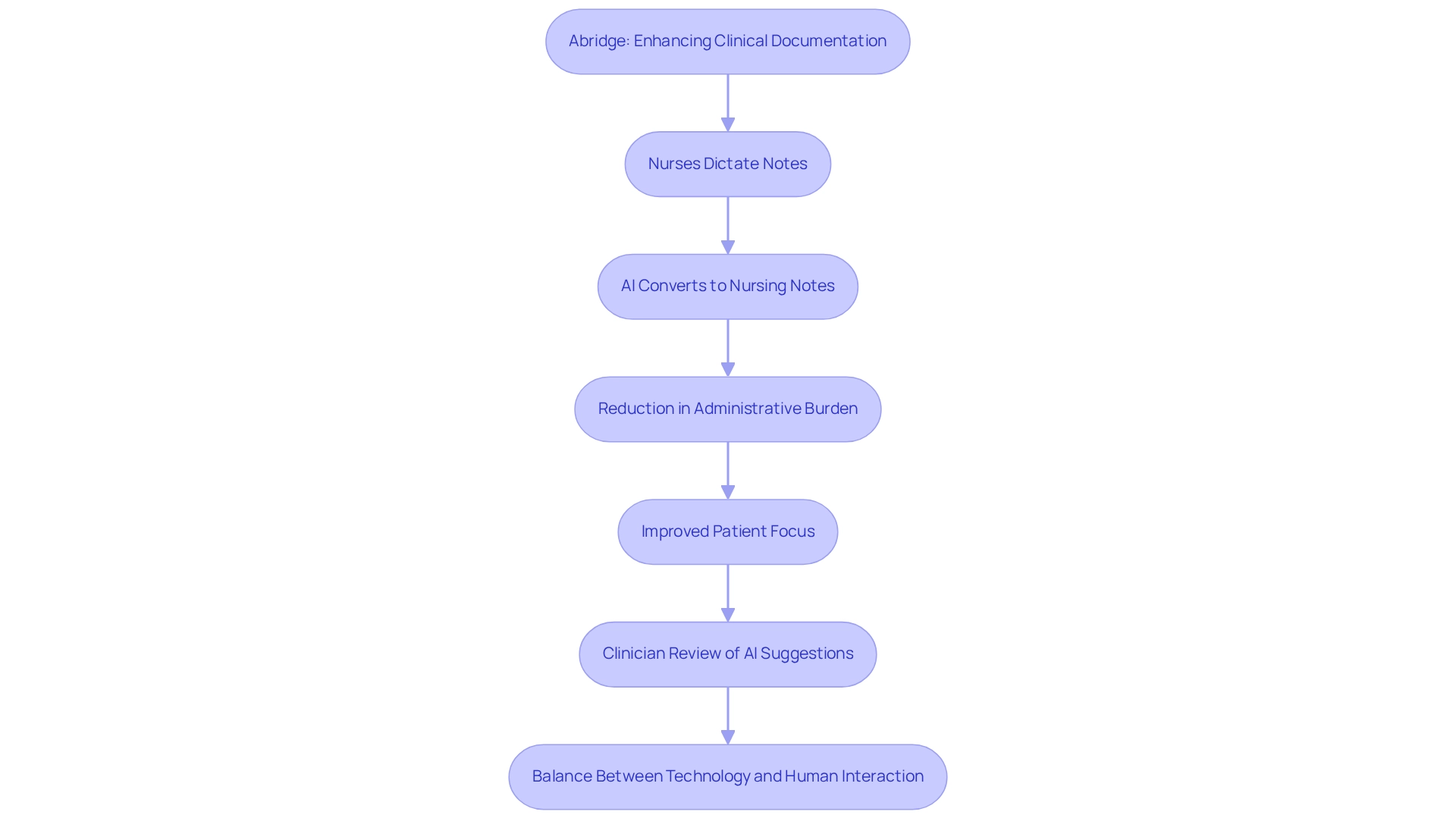
Cedars-Sinai Aiva Assistant: AI Support for Nursing Efficiency
The Aiva Assistant at Cedars-Sinai serves as a transformative AI tool, thoughtfully designed to ease the administrative burden on nurses by automating , including AI nursing notes. By simplifying these procedures, the Aiva Assistant empowers nurses to spend more time engaging with individuals, ultimately enhancing the quality of care provided. This integration not only boosts nursing efficiency but also addresses the concerns of medical providers, particularly physicians who may be apprehensive about embracing innovation due to fears about maintaining the quality of treatment and interactions with individuals.
Have you ever felt overwhelmed by administrative tasks? Research indicates that AI tools like Aiva can reduce these burdens by up to 30%, allowing medical professionals to focus on what truly matters—patient care. Furthermore, 50% of EU medical professionals express confidence that AI will enhance the quality of treatment for patients, highlighting the growing trust in AI's capabilities.
The financial implications of AI adoption in healthcare are promising. Forecasts suggest that wider implementation could lead to annual savings of up to $360 billion. As Philip H. insightfully notes, 'AI adoption is set to accelerate across nearly every industry over the next five years, transforming how businesses operate,' including the medical sector. Additionally, 75.7% of radiologists place their trust in the outcomes generated by AI nursing notes, reinforcing the credibility of these tools in clinical environments. As AI continues to evolve, tools like the Aiva Assistant are poised to revolutionize healthcare practices. This ensures that providers can operate more effectively while adhering to the highest standards of service. Embracing such innovations can foster a more compassionate and efficient healthcare environment, ultimately benefiting both providers and patients alike.
Generative AI: Transforming Communication and Documentation in Nursing
Generative AI tools are transforming healthcare documentation, providing a much-needed solution to the emotional challenges faced by healthcare providers. Imagine being able to engage more fully with clients, as these tools enable real-time transcription and summarization of interactions. This innovative technology significantly enhances record accuracy, traditionally spent on documentation tasks.
By automating these processes, nurses can dedicate more time to meaningful interactions, ensuring that care remains personalized and attentive. Have you ever felt overwhelmed by administrative duties? With generative AI, caregivers can focus on delivering compassionate care instead of being bogged down by paperwork. As we approach 2025, the impact of AI nursing notes on nursing documentation is becoming increasingly evident.
Experts note that while real-time transcription streamlines workflows, concerns about AI reliability can hinder adoption in clinical settings. However, inspiring case studies, such as those highlighting CosmaNeura, show that medical providers utilizing AI nursing notes experience increased efficiency and job satisfaction. This not only allows them to provide superior quality service but also ensures adherence to ethical standards, ultimately transforming medical delivery and enhancing patient-focused support.
Moreover, generative AI addresses critical challenges in the medical field, such as physician burnout and fragmented communication. By reducing the administrative burden on nurses, these tools improve the flow of information between providers with the use of AI nursing notes. Consider how this could enhance your practice: by improving access to services and potentially reducing expenses through heightened efficiency, these AI tools are not just enhancing documentation; they are creating a more sustainable medical system.
- Enhanced record accuracy
- Increased efficiency and job satisfaction
- Improved patient interactions
- Reduction of administrative burdens
Together, let’s embrace the future of healthcare, where technology supports compassionate care and nurtures both providers and patients alike.
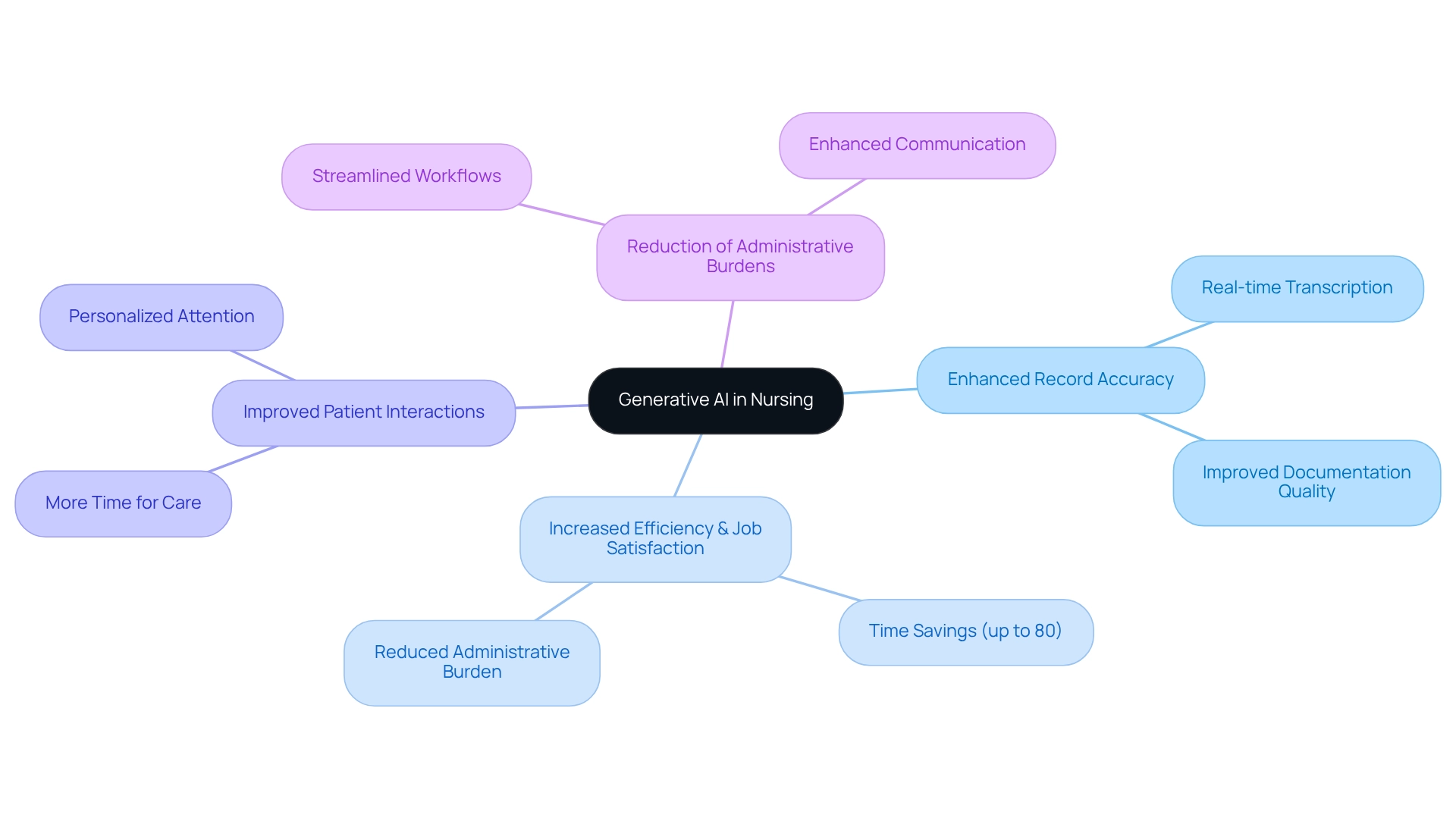
AI Tools: Reducing Documentation Burdens Across Healthcare Systems
[AI nursing notes](https://cosmaneura.com) are rapidly becoming essential in medical systems, offering much-needed relief from the documentation burdens that nurses often face. By automating routine tasks such as data entry and report creation, these innovative solutions allow medical professionals to utilize AI nursing notes, enabling them to devote more time to delivering exceptional care to their patients. Have you ever felt overwhelmed by paperwork? Statistics reveal that 39% of Americans are comfortable relying on AI nursing notes for their medical needs, highlighting a growing acceptance of technology in patient care that is particularly crucial for nursing staff. Moreover, an impressive 75.7% of radiologists express confidence in the outcomes generated by AI-based algorithms, reinforcing the reliability of these tools in clinical environments.
Yet, the integration of AI into healthcare comes with its own set of challenges. Many physicians exhibit hesitance towards these advancements due to concerns about maintaining the quality of care and the patient-physician relationship. Case studies illustrate how platforms like CosmaNeura are addressing these worries by demonstrating can enhance patient support while streamlining documentation processes. By automating administrative tasks and optimizing billing, these solutions not only contribute to increased revenue but also enhance job satisfaction for nurses, enabling them to engage more meaningfully with their patients through AI nursing notes, as the impact of AI on healthcare documentation continues to grow. Experts emphasize that while AI nursing notes can significantly reduce administrative burdens, it is vital to preserve the personal touch in healthcare. This transition not only elevates the quality of care provided but also aligns with the ethical standards upheld by faith-based service providers, ensuring that care remains compassionate and responsible.
Key Solutions to Consider:
- Automating routine tasks to free up time for patient care.
- Enhancing job satisfaction for healthcare providers.
- Improving patient support through innovative platforms.
Let us embrace these advancements together, ensuring that technology serves to enhance, rather than replace, the compassionate care that defines our healthcare system.
AI in Nursing: Evidence-Based Improvements in Patient Outcomes
Research indicates that incorporating AI nursing notes into nursing practice can significantly enhance outcomes for individuals. By providing nurses with advanced decision support tools and enabling real-time data analysis, AI nursing notes not only enhance clinical decision-making but also minimize the risk of errors. Have you ever wondered how technology can transform patient care? A recent study highlighted that 33% of medical professionals strongly believe that AI nursing notes will increase satisfaction among those receiving care. However, it’s vital for nurses to understand the AI nursing notes processes in order to build trust and effectively integrate these tools into their practice. Many nurses may feel apprehensive, as resistance to the adoption of AI nursing notes often stems from a lack of awareness and knowledge about its applications. This concern is echoed in the broader medical community, where numerous physicians express fears that innovation might jeopardize treatment.
Moreover, a notable 12.7% of participating nurses viewed AI as a threat rather than an opportunity, underscoring the importance of addressing these feelings. Ethical frameworks are being developed to ensure responsible deployment of AI nursing notes in hospital systems, as discussed in the case study titled '.' This evidence-driven approach guarantees that treatment remains both effective and efficient, ultimately fostering a more trustworthy medical environment as we utilize AI nursing notes to support our work and enhance patient care. How can we embrace these advancements to alleviate our burdens and improve outcomes? Together, we can create a future where technology and compassion go hand in hand.
Ethical Considerations: AI's Role in Nursing Practice
The incorporation of AI into nursing practice brings forth significant emotional challenges, particularly regarding ethical considerations such as individual privacy, data security, and the potential for algorithmic bias. It is crucial for healthcare organizations to establish strong ethical standards to ensure that AI technologies enhance care without compromising individual rights. How can we create an environment where technology serves us without losing sight of our values? Adhering to ethical standards in AI development fosters transparency and accountability, which are essential for maintaining trust in medical systems.
The psychological impact of false negatives and false positives can deeply affect individual well-being and confidence in these systems. This underscores the importance of in healthcare. Nurses are vital advocates for these ethical practices, ensuring that AI tools are used responsibly. As one expert poignantly stated, "I have no doubt that ethics is important, but it does not help the technological progress of AI. [...] Ethics can really prevent any meaningful advancement." This statement illustrates the delicate balance between technological advancement and the necessity of ethical standards.
Moreover, findings from the case study titled 'AI Ethics in Healthcare' reveal that following ethical standards can lead to improved care for individuals while respecting personal rights. As the healthcare landscape evolves, it is essential for medical professionals to remain vigilant in addressing these ethical dilemmas, fostering an environment where AI can be effectively employed while safeguarding individual well-being. The varying prioritization of ethics among experts in the field further highlights the need for consistent ethical guidelines across the industry. Let us come together to ensure that as we advance technologically, we do so with compassion and respect for those we serve.
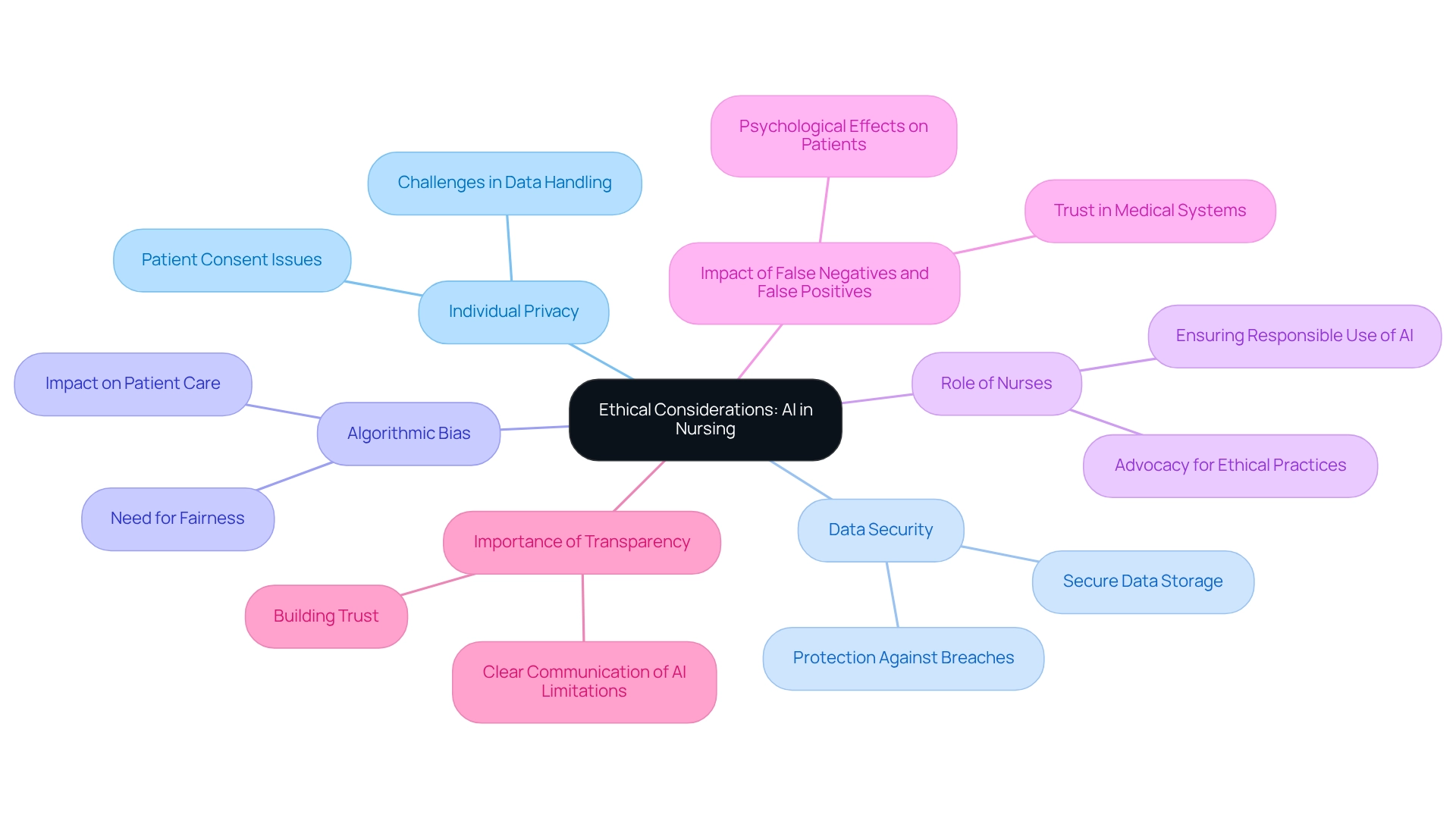
Diagnostic Guidance: AI's Contribution to Nursing Practice
AI technologies are reshaping diagnostic guidance in healthcare by thoughtfully analyzing individual data and uncovering patterns that may not be immediately visible. This remarkable ability empowers nurses to make more informed clinical decisions, significantly enhancing diagnostic accuracy. For instance, studies show that AI can improve diagnostic precision by up to 20%, as highlighted in the AMA journal by Jabbour et al. in 2023. This advancement leads to more prompt and efficient care for individuals, addressing the urgent need for improvement in patient outcomes, while the integration of AI nursing notes not only streamlines the decision-making process but also allows nurses to focus on meaningful interactions with individuals rather than getting bogged down by administrative tasks. A case study on CosmaNeura exemplifies this transformation, demonstrating how the implementation of AI solutions resulted in substantial time savings for clinicians and increased revenue through optimized billing practices. Ultimately, this enhances the quality of diagnostic guidance and alleviates the common concerns among medical professionals about the risks associated with adopting new technologies. By improving treatment, AI can enhance the quality of interactions, fostering a more compassionate care environment.
Expert insights underscore the importance of AI in clinical decision-making. As industry leader Rojas notes, AI's ability to assist in recognizing critical health patterns, such as in , can lead to improved patient outcomes by supplementing the clinical decisions made by medical professionals. Overcoming resistance to innovation is crucial, as AI solutions can provide the necessary support to healthcare providers, ensuring they deliver high-quality services while addressing their concerns.
Looking ahead to 2025, the role of AI in clinical practice is expected to expand even further. Advancements in pattern recognition and data analysis will enhance the diagnostic capabilities of practitioners. By leveraging these technologies, medical providers can ensure they offer high-quality, ethical care while upholding the principles of Catholic teachings. Ultimately, the use of AI nursing notes in healthcare practice not only improves documentation efficiency but also nurtures a more compassionate and effective environment for both providers and patients.
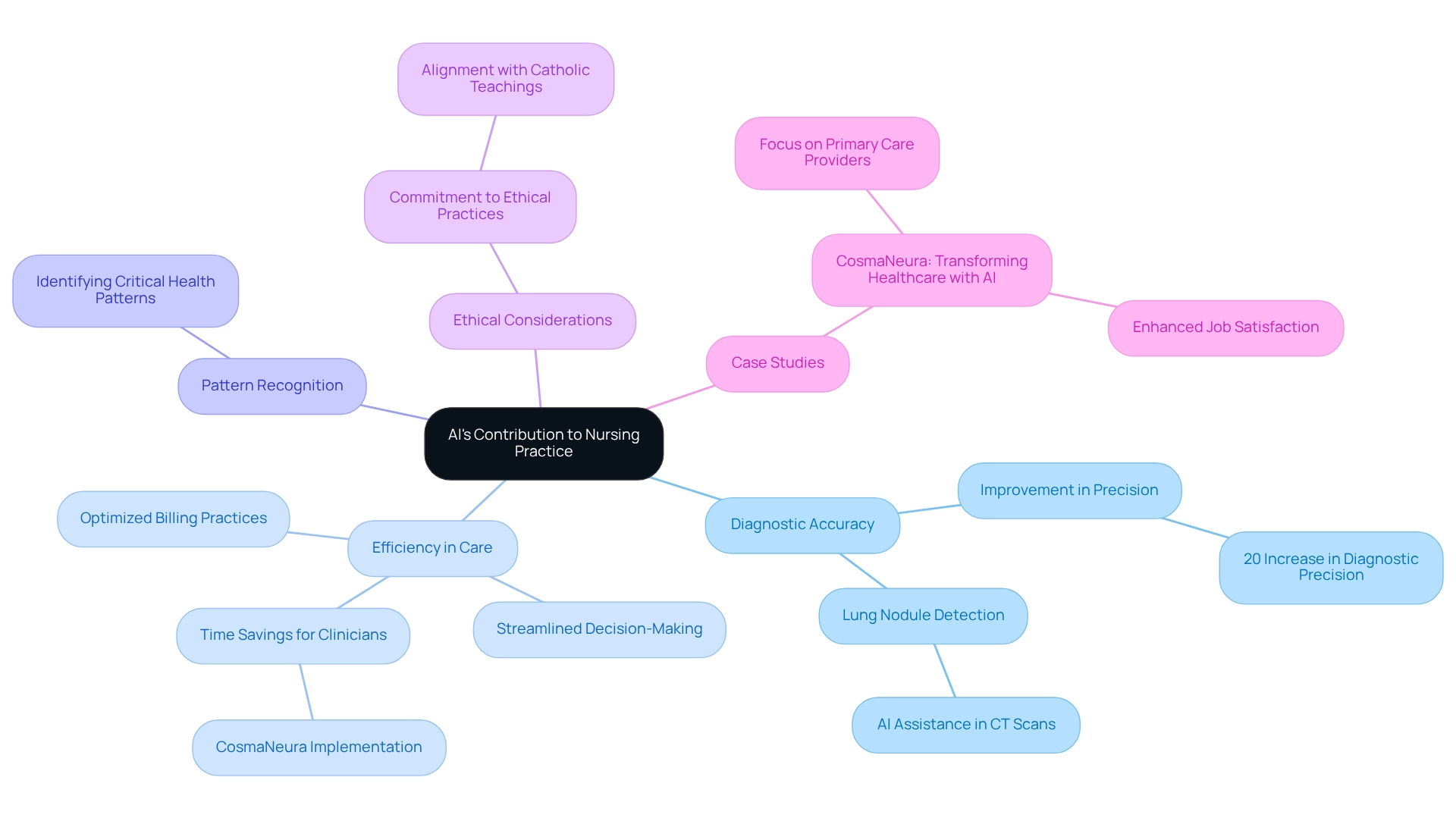
Future Innovations: The Next Steps for AI in Nursing
The future of AI in healthcare promises remarkable advancements, particularly in predictive analytics, personalized medicine, and tools that enhance client engagement. As these technologies evolve, nurses will face the challenge of adapting by utilizing to improve care delivery and outcomes for their patients. For instance, machine learning algorithms can analyze historical data to identify the most effective treatment strategies tailored to each individual, showcasing the power of predictive analytics in healthcare.
Furthermore, with 85% of the public supporting AI regulation for safety and transparency, healthcare providers must thoughtfully consider the ethical implications of AI in caregiving. Ongoing education and skill development are essential for healthcare professionals to leverage AI's potential effectively. This dedication to continuous learning ensures that the core of the profession—genuine patient connections—remains a priority.
As a nurse manager aptly puts it, "While AI may advance us in medical progress, it's crucial to approach it with the awareness that our dedication to compassionate support remains the cornerstone of the profession." This perspective reinforces the notion that AI should enhance, rather than replace, compassionate care.
As we look towards 2025, the integration of AI nursing notes in healthcare will not only streamline documentation processes but also pave the way for innovative service delivery models that prioritize patient well-being. How can we ensure that these advancements serve to strengthen our commitment to compassionate care? Together, let's embrace the future of healthcare with a focus on empathy and support.
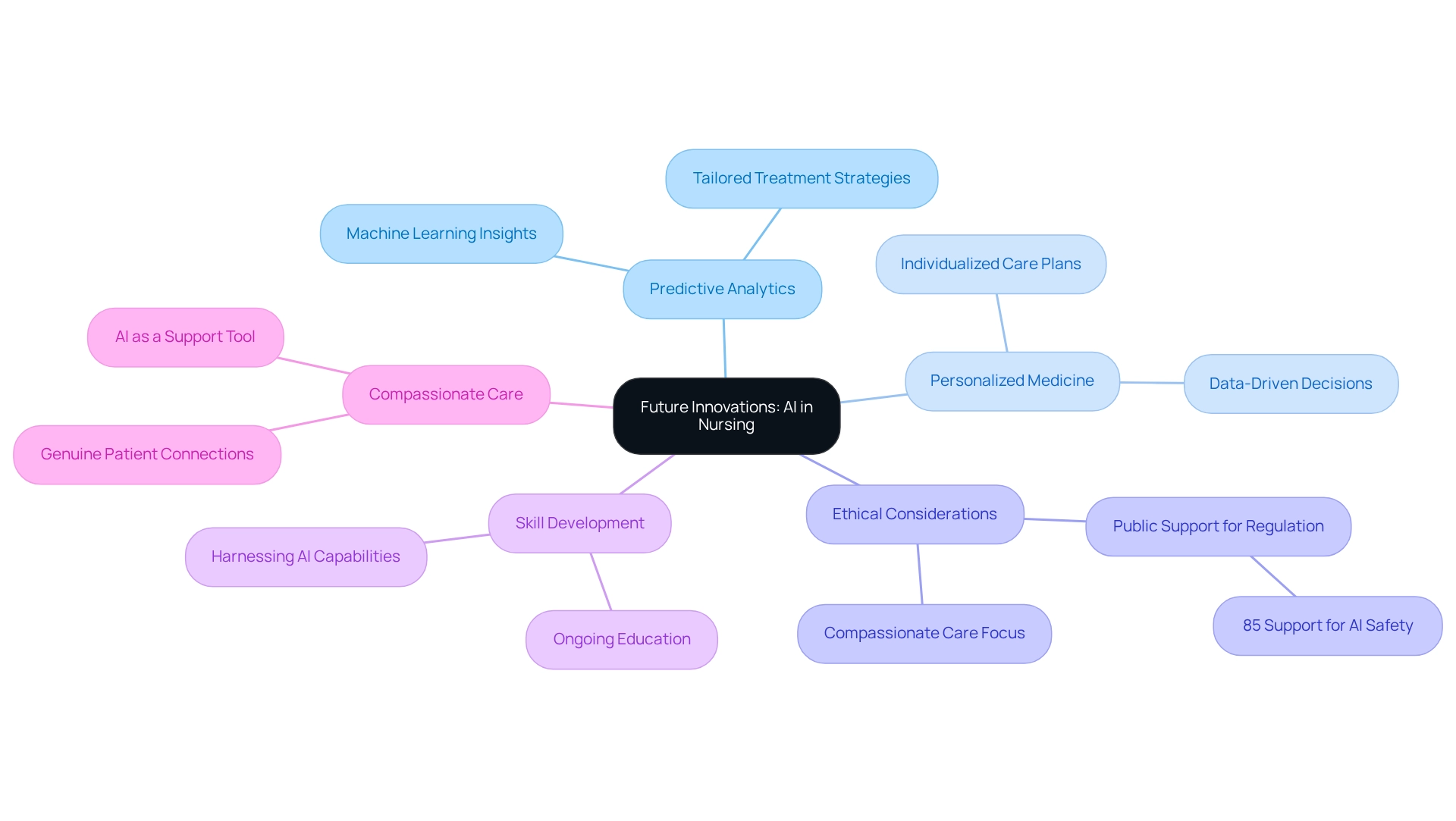
AI in Nursing Education: Preparing Future Healthcare Professionals
Incorporating AI into medical training is essential for nurturing future practitioners equipped with the vital skills to thrive in a technology-driven environment. Have you considered how AI training within healthcare curricula can empower students to effectively utilize AI tools? This integration not only enhances their ability to deliver high-quality, patient-centered care but also addresses the emotional challenges they face in their roles. A recent survey indicates that 89% of healthcare professionals believe AI nursing notes will expedite processes in the industry, highlighting the urgent need for this evolution. Moreover, case studies reveal that healthcare programs incorporating have experienced improved documentation efficiency and better preparedness among graduates. As Silvia Ferdousi poignantly states, 'Advancing healthcare practice with artificial intelligence: Enhancing preparedness for the future,' emphasizing AI's critical role in shaping educational practices. AI also plays a crucial role in ensuring compliance in healthcare education by monitoring regulatory requirements and updating course content, which is vital for maintaining high standards.
As the healthcare landscape continues to evolve, the importance of AI education for future nurses cannot be overstated. It prepares them to meet the demands of modern medical support effectively. By leveraging AI innovations, AI nursing notes can significantly help nursing education address the challenges of fragmented care delivery and physician burnout. This, in turn, enhances patient experiences and outcomes.
Key solutions include:
- Integrating AI training in curricula to enhance practical skills.
- Utilizing AI tools to streamline administrative tasks, allowing more time for patient care.
- Fostering a supportive learning environment that encourages collaboration and innovation.
Let us embrace these advancements to ensure that our healthcare professionals are not only prepared but also supported in their vital roles.
Conclusion
The integration of artificial intelligence in nursing documentation is not just a technological shift; it symbolizes a transformative movement aimed at enhancing patient care and easing the emotional burdens faced by healthcare professionals. AI-driven solutions, such as those provided by CosmaNeura, Abridge, and the Cedars-Sinai Aiva Assistant, are streamlining administrative tasks. This allows nurses to redirect their focus towards meaningful patient interactions. Such a shift not only improves operational efficiency but also aligns with ethical standards that prioritize compassionate care.
As evidence mounts regarding the positive impact of AI on documentation efficiency and patient outcomes, it becomes increasingly clear that the future of nursing practice is intertwined with these advancements. By automating routine tasks, AI tools help combat physician burnout, provide decision support, and enhance diagnostic accuracy. This ultimately fosters a more sustainable healthcare environment. However, the successful adoption of these technologies must address ethical considerations surrounding patient privacy, data security, and the necessity for clinician oversight.
Looking ahead, the role of AI in nursing is poised to expand further, driven by innovations in predictive analytics and personalized medicine. Continuous education and training in AI will be crucial for preparing future healthcare professionals to navigate this evolving landscape. Embracing AI should enhance, not replace, the core values of nursing, ensuring that genuine patient connections remain at the heart of care delivery. As healthcare providers continue to explore these transformative technologies, the potential for AI to reshape nursing practice and improve patient experiences is not just promising—it is essential for a compassionate and effective healthcare system.




